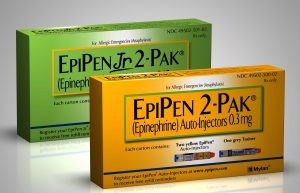 Mylan NV’s (NASDAQ:MYL) 400 percent price hike for the EpiPen has raised the ire of consumers that depend on the product’s life-saving capabilities. The company’s EpiPen is a mainstream drug used to treat life-threatening allergic reactions. Mylan has increased the price for the product from about $57 a shot in 2007 to more than $600 for two auto-injectors today. Mylan declined to comment when asked to explain the price hike.
Mylan NV’s (NASDAQ:MYL) 400 percent price hike for the EpiPen has raised the ire of consumers that depend on the product’s life-saving capabilities. The company’s EpiPen is a mainstream drug used to treat life-threatening allergic reactions. Mylan has increased the price for the product from about $57 a shot in 2007 to more than $600 for two auto-injectors today. Mylan declined to comment when asked to explain the price hike.
Now, members of Congress are demanding an explanation for the price hike. Senator Mark Warner, a Virginia Democrat, said in a statement Tuesday that the hike “places a significant burden on parents, schools and other purchasers of the EpiPen.” Senator Richard Blumenthal, a Connecticut Democrat, is calling for investigations by the Senate Judiciary Committee and the Federal Trade Commission.
Democratic nominee Hillary Clinton called the price increase “outrageous.” In a statement from her campaign, Clinton said, “Since there is no apparent justification in this case, I am calling on Mylan to immediately reduce the price of EpiPens.”
Bresch and the company successfully pushed legislation to encourage use of the EpiPen in schools nationwide before the latest price hike, effectively putting taxpayers on the hook for the bill. Mylan spent about $4 million in 2012 and 2013 on lobbying and got the 2013 School Access to Emergency Epinephrine Act passed. Mylan was also the top corporate sponsor of a group called Food Allergy Research & Education, which pushed for the bill encouraging schools to stock epinephrine auto-injectors.
Since 2012, Mylan has given away more than 700,000 free EpiPen’s to schools under a program that allows them to receive four free auto-injectors. However, schools have to use their own funds to purchase additional pens.
Mylan is the latest drugmaker to provoke substantial anger over steep price hikes. Earlier this year, Turing Pharmaceuticals AG, and Valeant Pharmaceuticals International Inc. were called to answer questions from congressional committees over buying the rights to older drugs that lacked competition and raising the prices. The scrutiny on EpiPen sent Mylan’s stock down as much as 6.2 percent Wednesday.
